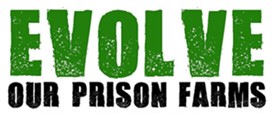Media Release
14 June 2018
PRISON-SOURCED BABY FORMULA LEAVES SOUR TASTE
KINGSTON, ONTARIO – Prison farm advocates are opposing the proposed goat dairy operation at Joyceville Institution on a range of ethical grounds.
“It defies sense,” says Calvin Neufeld, founder of Evolve Our Prison Farms. “Prisoners will be inseminating goats, removing their offspring, harvesting their milk, and shipping them to slaughter. Where is the rehabilitative value?”
In a program described by Minister Ralph Goodale as “emphasizing rehabilitation” through “animal therapy,” milk from the fully indoor 1500-goat operation will reportedly be sold to the Feihe infant formula factory being constructed in Kingston. Most of the product will be shipped to China.
“Definitely it’s connected to the marketing opportunity with Feihe,” says Dianne Dowling, member of the Prison Farm Advisory Panel, in a statement to the Kingston Whig-Standard. She points to a “looming demand” for both cow and goat milk once the facility begins production in 2019.
Consumers in China are on alert as prison-sourced baby formula leaves a sour taste.
Feihe’s decision to build a factory in Canada is “all about reputation” after the 2008 tainted infant formula scandal in China. Dairy Farmers of Ontario told CBC News that Feihe chose Canada because “it’s known to be of the highest quality – safe, reliable milk.”
The Chinese government has invested billions into its milk manufacturers, including Feihe, to “help domestic dairy companies raise quality and win back consumers.” Feihe also received millions in Canadian funding at the federal and provincial level, in what a CDC spokesperson described as “a lot of hand-holding.”
Consumers in China question the logic of adding prisons to the long list of suppliers for baby formula, especially when product distrust is still raw.
No public statement has been issued from Correctional Services Canada or the Minister of Public Safety with regard to the specific plans being implemented.
Since 2016, Evolve Our Prison Farms has advocated plant-based prison agriculture enhanced by farmed animal sanctuary as a non-violent and non-exploitative therapeutic model. While this was one of three formal recommendations issued by CORCAN in 2017, a CSC spokesperson has indicated that “There is no new review with respect to type of operations approved with the exception of determining the type of livestock operation that will be included.”
Goodale remains open to adding cow dairy to the prison program. Since the cost of equipment for processing the milk is “prohibitive,” any cow milk would likely also go to Feihe.
The ethics of using prison labour to serve commercial interests is only one problem with this model. The government’s plan has been denounced by experts in law, criminology, and animal and interpersonal abuse, who argue that animal agriculture is not a model of animal therapy, and would put prisoners at risk of desensitization, emotional dissonance, violence, and trauma, which are contrary to the goals of rehabilitation.
Prisoners agree. In an informal survey of 150 inmates at Joyceville, 75% voted for plant-based agriculture or animal sanctuary as their top choice over a dairy model. Many expressed not wanting to harm animals or be near where animals are killed, yet Joyceville has an onsite abattoir which trains prisoners in slaughtering and butchering animals.
Evolve Our Prison Farms advocates a healthier, more ethical, compassionate and sustainable model with uncompromised rehabilitative value. The group has issued an appeal for prisoner non-participation in the prison farm program “until it is a program that does not exploit anybody.”
“This is about justice,” says Neufeld. “Prisoner justice, animal justice, environmental justice.”
“And with the China element, this is about consumer justice too. People have a right to know where their baby food is coming from.”
– 30 –
